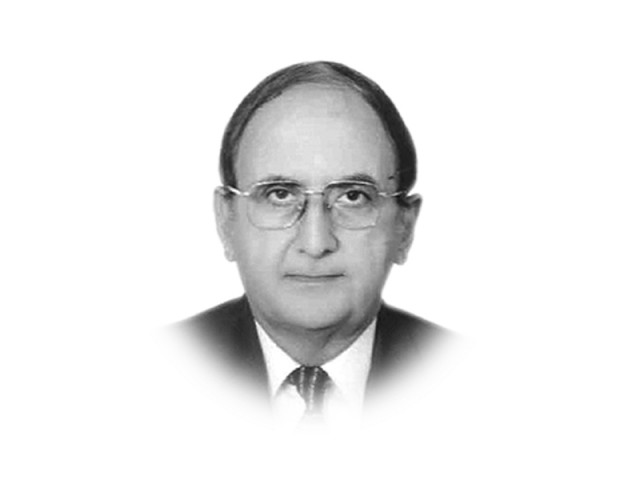Manufacturing leaders
Pakistan needs to develop strong institutions and establish the supremacy of law with depersonalised state mechanisms.

The writer is an independent political and defence analyst
The well-established democracies use entrenched institutions, a strict rule of law and depersonalised and representative procedures for recruiting political leadership. These arrangements also include in-built accountability. They have developed a democratic culture and a fully-articulated notion of citizenship that restrains individual political and material ambitions.
In countries like Pakistan, formal procedures are often trumped by dominant societal and political elite, political factionalism and an expanded role of non-elected state institutions. Some of them have a tendency to develop an aura of self-righteousness based on some religious and narrow sociopolitical ideological framework. The underlying assumption is to exercise strong control on how civilian political leaders are recruited. There is often an attempt to encourage a leadership of particular orientations and discourage others. There is a strong distrust of the capacity of ordinary people to elect their leaders.
The key question is: should the guardians of the political system decide who can reach the positions of leadership or should the people elect their leaders from amongst those fulfilling the broad-based and depersonalised legal conditions? Democracy favours the latter option.
Seven major factors have led individuals and state institutions to engage in a futile exercise of manufacturing leaders to their satisfaction. First, the military regimes in Pakistan have created a strong tradition of using state institutions and legal procedures to exclude those political leaders, who question the primacy of the military and co-opt those who are willing to work with the military regime to civilianise military rule. The military regimes of Ayub Khan, Ziaul Haq and Pervez Musharraf created leaderships that owed their rise to military regimes and stayed docile with it.
Second, there are individuals and groups who see no future for themselves in elections and democracy. Either they do not contest elections or perform extremely poorly in them. They do not mind if the electoral system is subverted.
Third, some ideologically motivated people, especially with strong orthodox religious views, reject elections and democracy as Western implants in Muslim societies. They think that the current arrangements negate the Islamic notion of ‘shura’ and governance.
Four, when laws are open-ended and clear-cut procedures are not evolved to implement them, many officers have a tendency to interpret such laws differently, and often times, discretion is used in a personalised manner. They do not mind creating problems for others by using punitive measures to the maximum.
Five, there has been a constant campaign against political leaders, especially against the two major political parties, i.e., the PPP and the PML-N, over the last couple of years. A good number of people want to knock out these two parties. General Zia targeted the PPP for punitive action. Musharraf made an unsuccessful bid to knock out the PPP and the PML-N.
Six, there are people who have a naïve view of politics. They think that Pakistan’s problems will be resolved if somebody appears on the political scene as a saviour and resorts to ‘ruthless accountability’ of corrupt political leaders. One wonders if political leaders are the only corrupt people in Pakistan.
Seven, the Supreme Court’s over-activism has, at times, manifested impatience towards the political government and political leaders. This increased the crisis of legitimacy for civilian leaders. Recently, the chief justice has advised the officers scrutinising the nomination papers of electoral candidates to perform their task without any fear, which encouraged them to adopt a tough posture on implementing Articles 62 and 63. The junior courts have started giving punishments quickly on the fake degree cases pertaining to the 2002 election.
Articles 62 and 63 were inserted in the Constitution by General Zia as a potential sword to chop off the political role of some leaders. That is why generalised provisions were put in without describing the precise procedures for their implementation. He did not rely much on them in 1985 because he excluded political parties from the 1985 elections.
Now, the election commission’s quietness and the Supreme Court’s activism have given enough space to officials to turn the scrutiny of the nomination papers into an examination of Islamic and Pakistan Studies for the candidates. These officials have, in several cases, violated the basic provision of the Constitution that requires a court conviction for a large number of provisions. They cannot disqualify a person on their own for the alleged negation of the ideology of Pakistan in a newspaper article or if there is some FIR or report of water theft. There must be a court conviction on these counts.
It is a mistaken notion that democracy will succeed if parliamentarians are highly pious and angel-like. If you monitor the election campaign, no voter is asking the candidates to recite verses from the Holy Quran. Their questions pertain to the services the candidate provided to the community during the last five years.
The personalised and subjective application of Articles 62 and 63 will neither strengthen democracy nor salvage the economy, faltering under the dark shadow of poor governance, religious extremism and terrorism.
Pakistan needs to develop strong institutions and establish the supremacy of law with depersonalised state mechanisms. Different state institutions should respect one another rather than one state institution trying to dominate others. Leaders are not manufactured through legal and administrative measures or judicial activism. Pakistan needs societal transformation in the direction of democratic culture that assigns primacy to the people rather than a few institutions and officials playing the role of guardians of the state and society.
Published in The Express Tribune, April 8th, 2013.













COMMENTS
Comments are moderated and generally will be posted if they are on-topic and not abusive.
For more information, please see our Comments FAQ